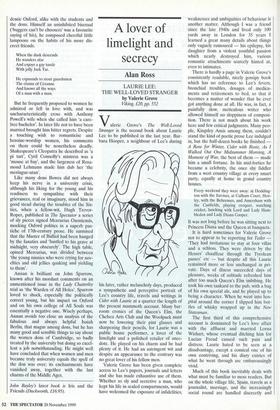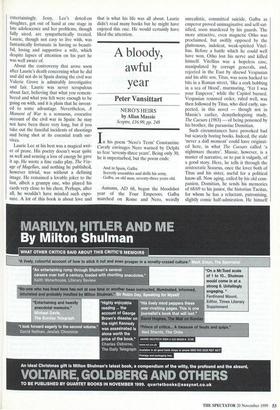A lover of limelight and secrecy
Alan Ross
LAURIE LEE: THE WELL-LOVED STRANGER by Valerie Grove Viking, £20, pp. 552
Valerie Grove's The Well-Loved Stranger is the second book about Laurie Lee to be published in the last year. Bar- bara Hooper, a neighbour of Lee's during
his later, rather melancholy days, produced a sympathetic and perceptive portrait of Lee's country life, travels and writings in Cider with Laurie at a quarter the length of the present mammoth account. Many bar- room cronies of the Queen's Elm, the Chelsea Arts Club and the Woolpack must now be lowering their pint glasses and sharpening their pencils, for Laurie was a public house performer, a lover of the limelight and a polished retailer of anec- dote. He played on his charm and he had plenty of it. He had an astringent wit and despite an appearance to the contrary was no great lover of his fellow men.
Valerie Grove has been given complete access to Lee's papers, journals and letters and she has made exhaustive use of them. Whether so sly and secretive a man, who kept his life in sealed compartments, would have welcomed the exposure of infidelities, weaknesses and ambiguities of behaviour is another matter. Although I was a friend since the late 1940s and lived only 100 yards away in London for 35 years I learned a great many details about things only vaguely rumoured — his epilepsy, his daughter from a violent youthful passion which nearly destroyed him, various romantic attachments scarcely hinted at, even to intimates.
There is hardly a page in Valerie Grove's consistently readable, nicely gossipy book which has no reference to Lee's fevers, bronchial troubles, dosages of medica- ments and retirements to bed, so that it becomes a matter of wonder that he ever got anything done at all. He was, in fact, a painfully slow, meticulous writer who allowed himself no sloppiness of composi- tion. There is not much about his work here and few critical judgments. Many peo- ple, Kingsley Amis among them, couldn't stand the kind of poetic prose Lee indulged in, but the half-dozen books he finished A Rose for Winter, Cider with Rosie, As I Walked Out One Midsummer Morning, A Moment of War, the best of them — made him a small fortune. In his mid-forties he became a celebrity, the once shy fiddler from a west country village at every smart party, equally at home in gratid country houses.
Every weekend they were away: at Dodding- ton with the Jarvises, at Culham Court, Hen- ley, with the Behrenses, and Amersham with the Canfields, playing croquet, watching cricket, lunching with Lord and Lady Ham- bleden and Lady Diana Cooper.
It was not long before he was sitting next to Princess Diana and the Queen at banquets.
It is hard sometimes for Valerie Grove not to appear to be reporting for Tatler 'They had invitations to stay at four villas and a schloss. They were driven by the Hesses' chauffeur through the Tyrolean passes' etc — but despite all this Laurie remained more or less unchanged in pri- vate. Days of illness succeeded days of pleasure, weeks of solitude refreshed him after too much Queen's Elm imbibing. He took his own tankard to the pub, with a bag of his own special ale, and he played up to being a character. When he went into hos- pital around the corner I slipped him bot- tles of whisky wrapped up in the New Statesman.
The first third of this comprehensive account is dominated by Lee's love affair with the affluent and married Lorna Wishart, whose eventual ditching him for Lucian Freud caused such pain and distress. Laurie hated to be seen at a disadvantage, except a comical one of his own contriving, and his diary entries of what he went through are embarrassingly vivid.
Much of this book inevitably deals with what must be familiar to most readers. But on the whole village life, Spain, travels as a journalist, marriage, and the increasingly social round are handled discreetly and entertainingly. Jessy, Lee's doted-on daughter, got out of hand at one stage in late adolescence and her problems, though fully aired, are sympathetically treated. Laurie, though not easy to live with, was fantastically fortunate in having so beauti- ful, loving and supportive a wife, which despite lapses of attention on his part he was well aware of.
About the controversy that arose soon after Laurie's death concerning what he did and did not do in Spain during the civil war Valerie Grove is admirably investigative and fair. Laurie was never scrupulous about fact, believing that what you remem bered and what you felt were enough to be going on with, and it is plain that he invent- ed to some advantage. Nevertheless, A Moment of War is a sensuous, evocative account of the civil war in Spain: he may not have been there very long, but if you take out the fanciful incidents of shootings and being shot at its essential truth sur- vives.
Laurie Lee at his best was a magical writ- er of prose. His poetry doesn't wear quite as well and sensing a loss of energy he gave it up. He wrote a fine radio play, The Voy- age of Magellan, and nothing he published, however trivial, was without a defining image. He remained a lovable joker to the last, albeit a grumpy one, who played his cards very close to his chest. Perhaps, after all, he wouldn't have minded such expo- sure. A lot of this book is about love and that is what his life was all about. Laurie didn't read many books but he might have enjoyed this one. He would certainly have liked the attention.



























































































 Previous page
Previous page